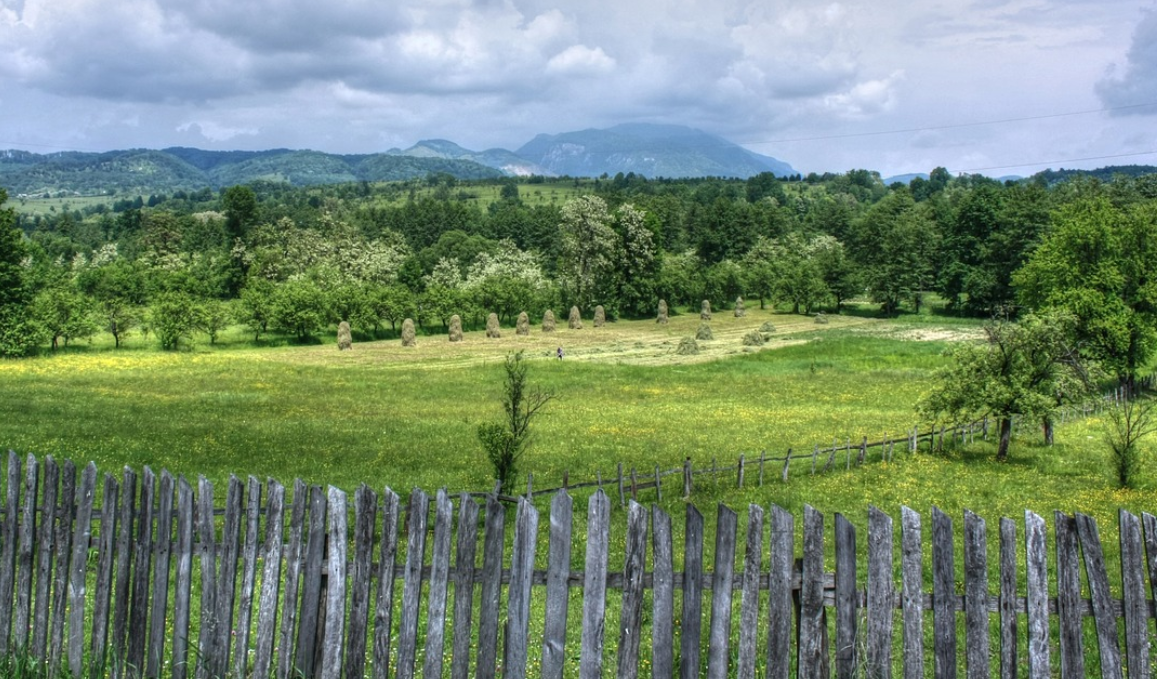It’s finally time to make the move out of your mobile home park. Maybe it’s been a dream of yours for a long time—find a beautiful spot and create an oasis of your own. Perhaps it’s many rolling acres of ground in farm country. Or it could be a scenic woodland locale.

Wherever your dream home location, let’s explore how to move your mobile home out of a park and onto private property.
Two sides of the same coin
Obviously, what you have going on here is a moving process. But, keep in mind that it includes both the responsibilities for moving out of your mobile home park and the responsibilities of moving onto your private property. So, let’s take some time for both of these processes. You can look at it as two sides of the same coin. On one side you have the moving out process and, on the other side, the moving in process.
Moving out of a park
If you’ve moved a mobile home before, one thing you already know is that it’s probably going to take more than just you. Think you can hook that double wide up to your Ford F350 and haul away? Uh, no. This calls for a mobile home mover.
However, when it comes to moving something as precious as your home, take time to find the right mobile home mover. Not only will you want to shop around to get a good price, but also be sure to find a mover who is licensed and insured. Plus, search for someone who is responsive and polite. If they don’t return your phone calls for a week, ask yourself—is this really my best option?
Pack it on up and move it on out
Of course, finding a mover isn’t the only step to get your mobile home out of that park and onto that beautiful new property. There are other things to consider, too. And one of them is getting all your furniture and household items packed and ready to go.
Looking around your house, you probably see plenty of packing to do (unless you’re a minimalist, that is). But, don’t worry, take a deep breath and tackle it one step at a time. Just because it all needs to be packed doesn’t mean it all needs to be packed this very moment.
Start by taking stock
Before you begin your packing, take some time to determine what you do and don’t need to pack. This question could be twofold:
- What can go on a truck without being put in a box (e.g. furniture, other large items)?
- What could I get rid of (downsizing)?
Of course, not everything needs a box around it. In fact, you might have a bit of trouble trying to find a box large enough for things like your couch or your mattress. At this stage, just take stock of the things you won’t need to pack up—the things that will go straight on to the moving truck as you load it. (But do note that you may still need moving covers to protect some of these items.)
What you do and don’t need
As we mentioned in our second question, now could be a good time to downsize a bit if you have things you genuinely don’t need. After all, why go to the trouble of packing it if you’re not going to use it once you get to your new place. Wasted energy, right?
You could even take a few minutes to do a walkthrough of your mobile home to look for things that you might want to let go of before the move. And if you do this with plenty of time to spare before moving day, you’ve done yourself a favor. That’s because you may still have time left to sell things you don’t want to pack.
Packing the contents of your home
Now, once you know what’s not being packed, time to turn to what is being packed. And if you’re going to be packing, you need something to pack in. So, time to find some moving boxes! Of course, you can always buy moving boxes if necessary, but you can also try to find them on the cheap or free.
Start by checking out Sara Butler’s How to Get All the Cheap Moving Boxes for Your Stuff in a 24-Hour Quest. In addition, some of your more delicate items may need some padding to protect them during the ride. One option is purchasing packing paper. But there’s also newspaper. And if you can get that free, it could be another way to save some cash.

Know a friend who gets the print version of a local or national newspaper? Ask if they’ll save copies for you when they’re done reading it. But, keep in mind you may want to put in your request a bit in advance of when you actually need the newspaper. That way, if the paper is weekly, they’ll have time to put away a good stock for you.
You still need to eat
Moving is a process not a point in time. So, even as you’re packing up your home, remember that you’ll still be living in it. The point? Pack systematically because you’ll still need to eat and sleep over the several days (if it takes that long) that you’re getting ready to go.
Leave out some necessities. For instance, plates, napkins, and cutlery or at least their disposable counterparts. You could even set them aside somewhere (like a laundry basket) so you can clear out your cupboards into packing boxes. Also, remember things like toilet paper, shampoo, toothbrushes, and toothpaste.
Private property: the other side of the coin
Now, let’s turn to the other side of the coin we mentioned earlier. You’re really looking forward to living on your own carefully-selected property. Perhaps it’s the quiet seclusion that draws you. Or maybe it’s the ability to hunt and fish “in your own backyard.” Whatever your reasons, you know that finding the right property is an important step in your moving process.
What are you looking for?
What is the ideal type of property for a mobile home? Well, that depends on who you are and what you want. There isn’t a perfect property type because different buyers have different tastes.
Maybe you’ve thought extensively about this already. In that case, you could have a clear picture of what you’re looking to buy. But if you haven’t given it much thought, now’s a good time. Identify what you’re in the market for. Consider writing it out on paper so you can refer back to it (or even share it with a real estate agent).
Who are you looking with?
Speaking of a real estate agent, that’s a perfect segue into our next topic. Who are you looking with? Rather, are you going to find this property on your own or are will you leverage the skills, abilities, and connections of others?
For one thing, you’re wondering whether you should get a real estate agent in on the process. Take a minute to check out Working with Real Estate Agents. Then, head to Main Advantages of Buying a Land Property Directly from Owner to learn a little about the flip side.
However, real estate agents aren’t the only people who know about land for sale. For one thing, the landowner would know. Neighbors who live near the available property could be aware, too. As could friends and acquaintances of the seller.
And some of those people could, in turn, be friends and acquaintances of yours. That’s why you can also consider using word of mouth to let people know you’re in the market for land or to ask if they know of any available.
What do you need to do to get it ready?
Once the property is yours, keep in mind that it may not be ready just yet for you to plop your mobile home down on it.

Instead, you may need to do some work to get it ready, including:
- Grading
- Putting in a permanent foundation if applicable
- Digging a well
- Making septic arrangements
- Arrange for electric hookup
- Putting in a driveway
- Clearing trees
Permits and Permissions
While moving certainly affects you and your family very much, keep in mind you are not the only ones it can impact. There are other people or groups who have a stake in what’s going on as well. For one, there’s the park management at your current location. Be sure you uphold your end of the agreement you made with them. Your park may have policies in place for moving a mobile home out of a park.
Thus, look through your rental agreement and find out what you agreed to. If you promised to give 60-day notice, then absolutely do that. In short, uphold your end of the bargain.
Another thing to note is that you need to be on top of any permits required to move your mobile home to the new location. While some of this may be covered by your mobile home mover, be sure to check with them about what they are and aren’t taking care of. Check with the local government agency that oversees issues like these to figure out what you need.
Plus, if the property is yours and you recently bought it, be sure everyone involved is clear on when you have the go-ahead to take possession. Obviously, you’ll want to schedule the move accordingly.
People
In addition to park management and the local government, you may have still more people with a vested interested in the whole situation: your new neighbors. For a minute, put yourself in their shoes. Perhaps they’ve been tracking the process as you viewed the land and started making necessary developments after purchasing. Understandably, they may be wondering what’s going on. And if they do, why not start out on the right foot by being open and friendly?
Sure, you might not feel like taking a break from your work. But you might do well to take that break anyway. Chatting with your new neighbors may help them get a feel for you and for the situation, which could help them be more comfortable and welcoming. While other residents of your mobile home park may have been used to people moving in and out, that might not be the case in a quiet country area.
Plus, you can consider giving the new neighbors your contact information. That way, they can reach out if they notice anything going on at the property you should know about. Additionally, remember to respect property boundaries as you get your plot ready for the arrival of your mobile home.
Your mobile home—someone else’s park
Of course, we hope your transition out of your mobile home park is smooth and painless. However, we know things don’t always work out according to one’s idea of a best-case-scenario. Here are a couple of things to keep in mind as you approach moving your mobile home out of the park.
- As we mentioned earlier, give notice as stipulated in your agreement with the mobile home park.
- Be sure you don’t owe back rent or have liens on your mobile home.
- Get proper legal help if you run into issues that require it.
Don’t go it alone
Now, that third point about proper legal help, just what do we mean by that? Let’s say you begin to suspect that your park management is putting undue hurdles in the way of your mobile home removal. Then, it may be time to check further.
You could start with research specific to your state to try to determine what legal boundaries are imposed on landlords. Still think there’s something fishy going on? Then, the next stops could be contacting the proper authorities or seeking assistance from a legal professional.

And if you’re thinking that the only legal recourse you have is to shell out thousands for a top attorney, think again. You may want to contact legal aid for your state to see if you’re eligible. Moreover, if legal aid isn’t the way to go, check out other options.
Finish up & settle in
When the time finally comes that you’ve successfully pulled your mobile home out of the park and onto your dream property, you’ll get to move on to the next stages of the process. Of course, there’s the unpacking and perhaps you’ll even decide to rearrange the furniture while you’re at it. Plus, you may be able to enjoy a few minutes chatting with your new neighbors if they drop by to welcome you.
Lastly, don’t neglect your new setup’s landscape. Explore 10 Types Of Gardens That Will Update Your Mobile Home Exterior or 12 Modern Upgrades For Your Mobile Home Porch & Outdoor Living Area.


